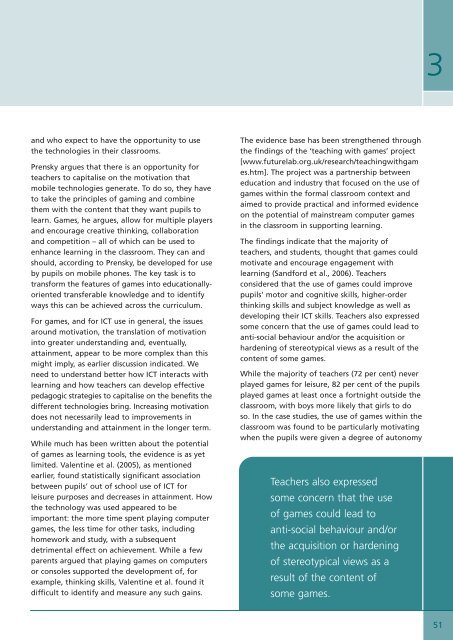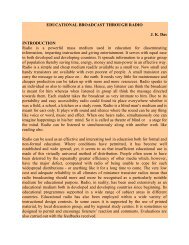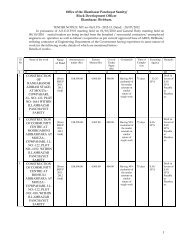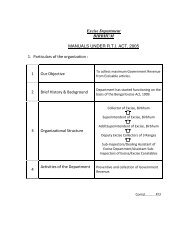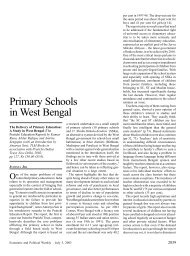The impact of ICT in schools - a landscape review - nationalarchives ...
The impact of ICT in schools - a landscape review - nationalarchives ...
The impact of ICT in schools - a landscape review - nationalarchives ...
Create successful ePaper yourself
Turn your PDF publications into a flip-book with our unique Google optimized e-Paper software.
and who expect to have the opportunity to use<br />
the technologies <strong>in</strong> their classrooms.<br />
Prensky argues that there is an opportunity for<br />
teachers to capitalise on the motivation that<br />
mobile technologies generate. To do so, they have<br />
to take the pr<strong>in</strong>ciples <strong>of</strong> gam<strong>in</strong>g and comb<strong>in</strong>e<br />
them with the content that they want pupils to<br />
learn. Games, he argues, allow for multiple players<br />
and encourage creative th<strong>in</strong>k<strong>in</strong>g, collaboration<br />
and competition – all <strong>of</strong> which can be used to<br />
enhance learn<strong>in</strong>g <strong>in</strong> the classroom. <strong>The</strong>y can and<br />
should, accord<strong>in</strong>g to Prensky, be developed for use<br />
by pupils on mobile phones. <strong>The</strong> key task is to<br />
transform the features <strong>of</strong> games <strong>in</strong>to educationallyoriented<br />
transferable knowledge and to identify<br />
ways this can be achieved across the curriculum.<br />
For games, and for <strong>ICT</strong> use <strong>in</strong> general, the issues<br />
around motivation, the translation <strong>of</strong> motivation<br />
<strong>in</strong>to greater understand<strong>in</strong>g and, eventually,<br />
atta<strong>in</strong>ment, appear to be more complex than this<br />
might imply, as earlier discussion <strong>in</strong>dicated. We<br />
need to understand better how <strong>ICT</strong> <strong>in</strong>teracts with<br />
learn<strong>in</strong>g and how teachers can develop effective<br />
pedagogic strategies to capitalise on the benefits the<br />
different technologies br<strong>in</strong>g. Increas<strong>in</strong>g motivation<br />
does not necessarily lead to improvements <strong>in</strong><br />
understand<strong>in</strong>g and atta<strong>in</strong>ment <strong>in</strong> the longer term.<br />
While much has been written about the potential<br />
<strong>of</strong> games as learn<strong>in</strong>g tools, the evidence is as yet<br />
limited. Valent<strong>in</strong>e et al. (2005), as mentioned<br />
earlier, found statistically significant association<br />
between pupils’ out <strong>of</strong> school use <strong>of</strong> <strong>ICT</strong> for<br />
leisure purposes and decreases <strong>in</strong> atta<strong>in</strong>ment. How<br />
the technology was used appeared to be<br />
important: the more time spent play<strong>in</strong>g computer<br />
games, the less time for other tasks, <strong>in</strong>clud<strong>in</strong>g<br />
homework and study, with a subsequent<br />
detrimental effect on achievement. While a few<br />
parents argued that play<strong>in</strong>g games on computers<br />
or consoles supported the development <strong>of</strong>, for<br />
example, th<strong>in</strong>k<strong>in</strong>g skills, Valent<strong>in</strong>e et al. found it<br />
difficult to identify and measure any such ga<strong>in</strong>s.<br />
<strong>The</strong> evidence base has been strengthened through<br />
the f<strong>in</strong>d<strong>in</strong>gs <strong>of</strong> the ‘teach<strong>in</strong>g with games’ project<br />
[www.futurelab.org.uk/research/teach<strong>in</strong>gwithgam<br />
es.htm]. <strong>The</strong> project was a partnership between<br />
education and <strong>in</strong>dustry that focused on the use <strong>of</strong><br />
games with<strong>in</strong> the formal classroom context and<br />
aimed to provide practical and <strong>in</strong>formed evidence<br />
on the potential <strong>of</strong> ma<strong>in</strong>stream computer games<br />
<strong>in</strong> the classroom <strong>in</strong> support<strong>in</strong>g learn<strong>in</strong>g.<br />
<strong>The</strong> f<strong>in</strong>d<strong>in</strong>gs <strong>in</strong>dicate that the majority <strong>of</strong><br />
teachers, and students, thought that games could<br />
motivate and encourage engagement with<br />
learn<strong>in</strong>g (Sandford et al., 2006). Teachers<br />
considered that the use <strong>of</strong> games could improve<br />
pupils’ motor and cognitive skills, higher-order<br />
th<strong>in</strong>k<strong>in</strong>g skills and subject knowledge as well as<br />
develop<strong>in</strong>g their <strong>ICT</strong> skills. Teachers also expressed<br />
some concern that the use <strong>of</strong> games could lead to<br />
anti-social behaviour and/or the acquisition or<br />
harden<strong>in</strong>g <strong>of</strong> stereotypical views as a result <strong>of</strong> the<br />
content <strong>of</strong> some games.<br />
While the majority <strong>of</strong> teachers (72 per cent) never<br />
played games for leisure, 82 per cent <strong>of</strong> the pupils<br />
played games at least once a fortnight outside the<br />
classroom, with boys more likely that girls to do<br />
so. In the case studies, the use <strong>of</strong> games with<strong>in</strong> the<br />
classroom was found to be particularly motivat<strong>in</strong>g<br />
when the pupils were given a degree <strong>of</strong> autonomy<br />
Teachers also expressed<br />
some concern that the use<br />
<strong>of</strong> games could lead to<br />
anti-social behaviour and/or<br />
the acquisition or harden<strong>in</strong>g<br />
<strong>of</strong> stereotypical views as a<br />
result <strong>of</strong> the content <strong>of</strong><br />
some games.<br />
3<br />
51


